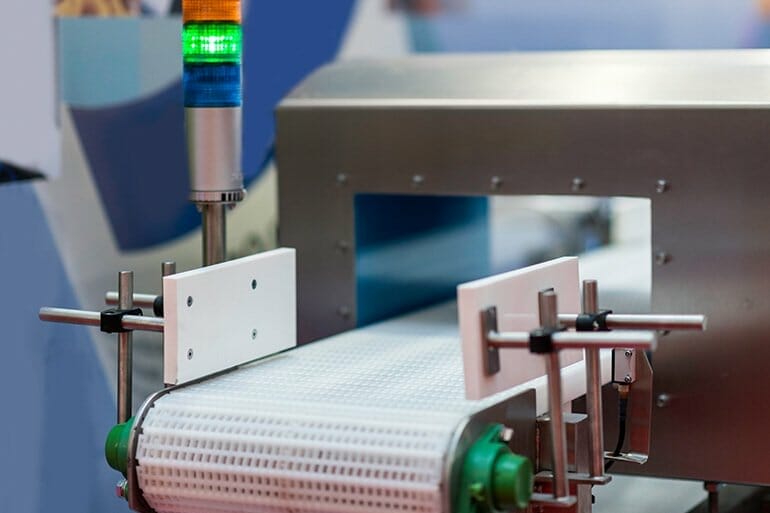
Metal detection in the food industry is a critical component of food safety programs. From ensuring compliance with regulations to protecting consumer health, metal detectors are essential tools for identifying and removing foreign metal objects from food products. Whether you’re a small food producer or a global manufacturer, understanding how metal detectors work and their importance in the food industry can help you safeguard your reputation and operations.
In this comprehensive guide, we’ll explore the key aspects of metal detectors for food, their role in food safety, and how to choose the right detection service for your needs.
Why Is Metal Detection Essential in the Food Industry?
Food manufacturers face increasing challenges in maintaining high safety standards while managing complex production processes. Metal detection in food plays a pivotal role in identifying contaminants like metal fragments that may inadvertently end up in products during harvesting, processing, or packaging.
The presence of even a small metal particle can result in:
- Costly recalls that damage brand reputation
- Consumer injuries, such as choking or internal harm
- Legal liabilities and regulatory fines for non-compliance with safety standards.
By implementing metal detector food industry solutions, manufacturers can prevent these risks, protect consumers, and maintain their standing with regulatory bodies like the FDA or USDA.
How Metal Detectors Work in the Food Industry
A metal detector for food operates by creating an electromagnetic field. As food products pass through the detector, the system identifies disruptions caused by metal objects—whether ferrous, non-ferrous, or stainless steel.
Here’s how the detection process typically works:
- Food is placed on a conveyor system or other transfer mechanism.
- The product passes through a metal detector, where electromagnetic fields scan for irregularities.
- The system flags contaminated products, automatically removing them from the production line.
This technology is designed to detect a wide range of metal contaminants, including shards from processing equipment, wires, screws, and even fine metal shavings.
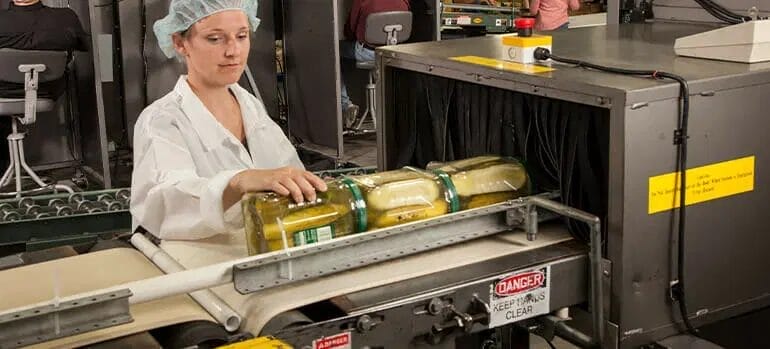
Types of Metal Detectors Used in Food Manufacturing
There are several types of metal detectors for food applications, each suited to specific manufacturing environments.
Conveyor Metal Detectors
Designed for high-speed production lines, these systems scan food products as they move through conveyor belts. They are ideal for packaged goods, baked items, and processed foods.
Gravity Feed Metal Detectors
These systems are perfect for inspecting free-flowing products such as grains, powders, and nuts. They are installed vertically in production lines, ensuring efficient detection.
Pipeline Metal Detectors
Used for inspecting liquids, pastes, and slurry products, pipeline detectors are essential for food manufacturers working with soups, sauces, or meat blends.
Handheld Metal Detectors
While not commonly used in large-scale operations, handheld detectors are useful for spot-checking and verifying specific areas of concern in production facilities.

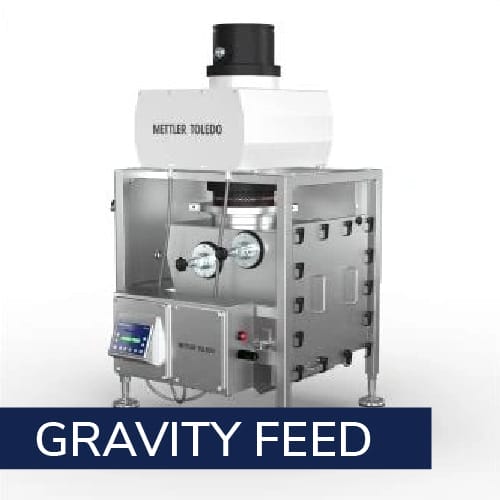
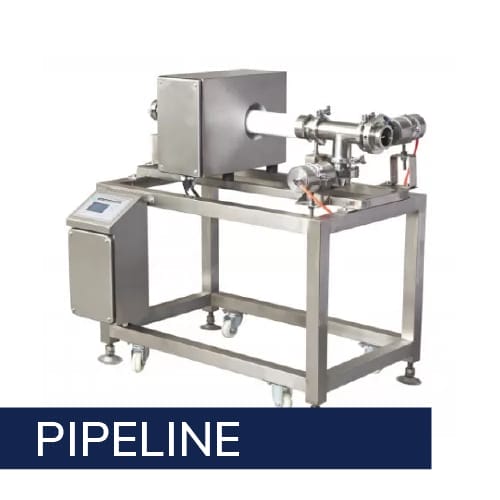

Common Sources of Metal in Food
Metal contaminants can enter food products at various stages of the production process. Some of the most frequent sources include:
- Processing Equipment: Broken machinery parts like blades, screws, or wires can introduce contaminants into food.
- Raw Materials: Metal fragments from farming tools or harvesting equipment can remain in raw ingredients.
- Packaging Materials: Foil, clips, or staples used in packaging may find their way into products.
- Operator Error: Mishandling or accidental dropping of tools during processing can also contribute to contamination.
Addressing these risks with reliable food metal detection systems is critical to maintaining safety.
Benefits of Partnering With a Metal Detection Service Provider
While many manufacturers invest in in-house metal detectors, outsourcing metal detection in food industry services can offer unique advantages, including:
Higher Accuracy and Sensitivity
Third-party service providers often use advanced detection systems capable of identifying contaminants as small as 0.8 mm or even smaller, ensuring greater precision.
Reduced Downtime
Outsourcing food metal detection allows your production line to stay operational while experts inspect batches offsite.
Expertise in Complex Cases
Service providers specialize in handling unusual or challenging contaminants, giving you peace of mind when dealing with sensitive recalls or inspections.
Cost Savings
Avoiding expensive recalls and lawsuits more than offsets the investment in professional inspection services.
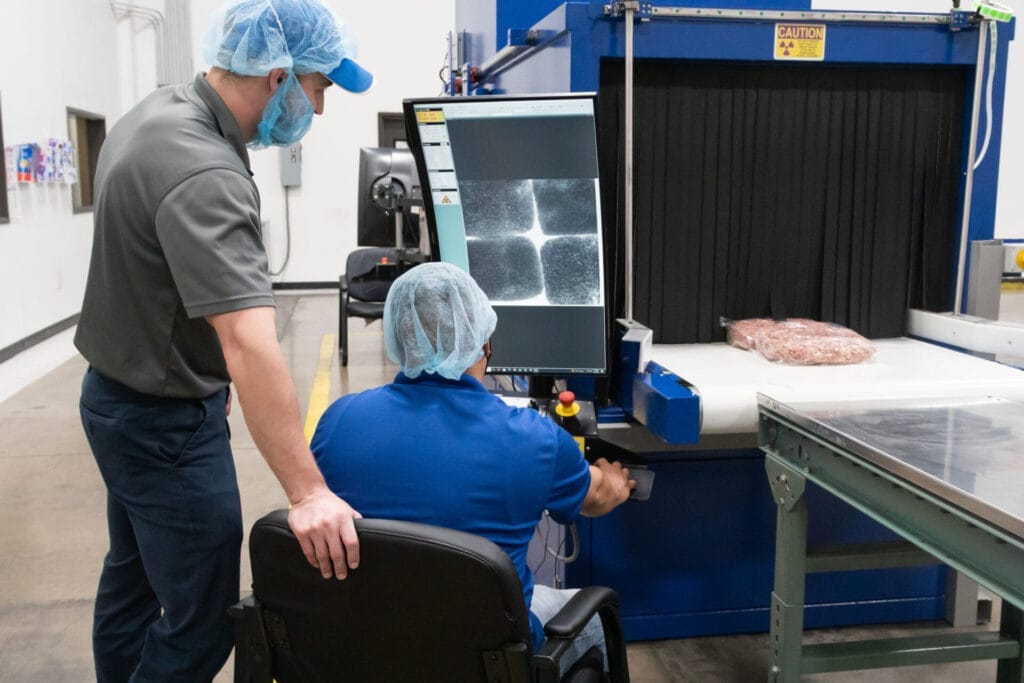
FlexXray: The Leader in Food Metal Detection Services
At FlexXray, we are experts in metal detector solutions for food and beverage producers. Our inspection services utilize state-of-the-art X-ray technology and metal detection equipment to ensure your products are free from contaminants.
Unlike traditional in-house systems, our services are designed to catch what others might miss, including:
- Extremely small fragments of ferrous and non-ferrous metals.
- Stainless steel particles that are notoriously difficult to detect.
- Contaminants embedded in dense or multi-layered products.
With decades of experience and a proven track record, we work with leading food manufacturers to keep their products safe and their operations running smoothly.
Choosing the Right Metal Detection Solution
When selecting a metal detector for food applications, consider these key factors:
- Sensitivity: Can it detect the smallest contaminants relevant to your product?
- Product Flow: Is the detector suitable for your production speed and volume?
- Ease of Integration: Can the system be seamlessly incorporated into your existing process?
- Regulatory Compliance: Does it meet FDA, USDA, and international safety standards?
FlexXray’s services are tailored to meet your specific needs, ensuring you have the most effective solution in place.
Ready to Protect Your Products?
Don’t let foreign material contamination jeopardize your business. Whether you’re facing a specific contamination issue or want to prevent future risks, FlexXray’s advanced food metal detection services are here to help.
Contact us today to learn how our inspection solutions can safeguard your products, your brand, and your bottom line.

Leave a Reply
You must be logged in to post a comment.